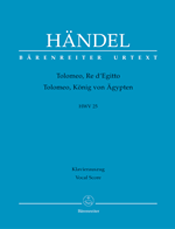The primary benefit of these vocal
scores seems clear enough: making available affordable, convenient, modern
critical editions of Handel’s operas.1 Hitherto, individuals have been
largely limited to reproductions of Chrysander’s admirable but often
unreliable ninetieth-century German scores (G. F. Händels Werke: Ausgabe
der deutschen Händelgesellschaft, 1858–94), which are availably for
purchase only sporadically (in the form, for example, of the Dover Score of
Giulio Cesare and Kalmus’s miniature reprint series).
Bärenreiter’s full-score editions, of course, have been beyond the means
of most individuals – Riccardo Primo and Tolomeo are
priced at €335.00 and €259.00 respectively – and are obviously intended
primarily for institutional purchase. At prices in the €25–€40 range,
however, the vocal editions are affordable to a wide range of scholars,
students, and performers.
As has generally been the case, the vocal scores of Riccardo
Primo and Tolomeo have followed the release of the full-score
editions of the same operas in the Hallische Händel-Ausgabe
(HHA) complete-works series.2 Needless to say, the vocal editions
cannot offer many of the advantages of the HHA full scores, which
have been nearly unanimously hailed for the wealth of explanatory information
they provide. The orchestrational indications, for example, offer only
sketches of Handel’s instrumentation, and are not always entirely clear.
Similarly, although a list of general procedural guidelines is supplied in
the front matter, explanations of specific editorial decisions are, of
necessity, extremely limited. The front matter, however, provides (in both
German and English) historical background, plot synopses, and, in the case of
Riccardo Primo, descriptions of the divergent versions of the opera,
giving students and scholars important contextual information. (These
passages are in some cases reproduced verbatim from the HHA
editions, and in others presented in condensed form.)
 On balance, Ricardo Primo, Tolomeo, and the rest of
the series serve their purpose quite well. For researchers, the editions will
likely save many a trip to the university library (especially if the vocal
scores are supplemented with background and source information from Winton
Dean’s two-volume monograph on Handel’s operas). Moreover, vocal
instructors, students, and professional singers alike are sure to find the
editions invaluable, in that they provide relatively easy access to
dependable editions of Handel’s operatic works with each new
publication.
On balance, Ricardo Primo, Tolomeo, and the rest of
the series serve their purpose quite well. For researchers, the editions will
likely save many a trip to the university library (especially if the vocal
scores are supplemented with background and source information from Winton
Dean’s two-volume monograph on Handel’s operas). Moreover, vocal
instructors, students, and professional singers alike are sure to find the
editions invaluable, in that they provide relatively easy access to
dependable editions of Handel’s operatic works with each new
publication.
Nathan Link
1. The vocal score of Amadigi di Gaula was published in late February 2008; Oreste is set to be published in May 2008.
2. There are three exceptions: the vocal scores for Ezio (scheduled for publication Summer 2008), Alcina (due for publication in 2009), and Giulio Cesare (publication date not yet clear) have preceded the publication of the respective HHA full score.

